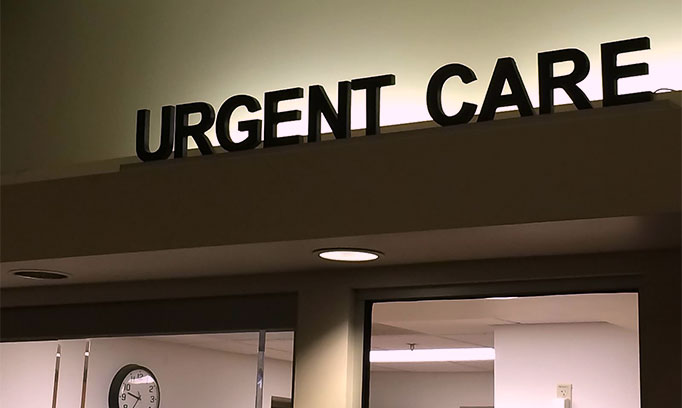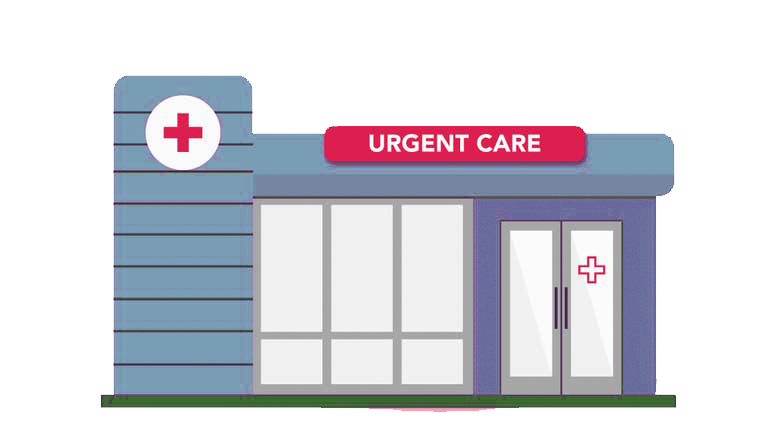A Comprehensive Guide to Using Urgent Care Prompt Treatment of Typical Ailments and Conditions
Urgent treatment centers play a pivotal duty in the healthcare landscape, supplying a critical alternative for patients looking for prompt therapy for non-life-threatening problems. What stays to be explored are the particular conditions that call for a check out to urgent care and the benefits of picking this alternative over conventional emergency situation services.
Recognizing Urgent Treatment Services
 Urgent care solutions give a vital bridge between health care and emergency situation departments, resolving a variety of non-life-threatening conditions that need prompt focus. These facilities supply prolonged hours and often operate without the requirement for a consultation, making them an accessible choice for individuals experiencing sudden medical issues outside of routine office hours.
Urgent care solutions give a vital bridge between health care and emergency situation departments, resolving a variety of non-life-threatening conditions that need prompt focus. These facilities supply prolonged hours and often operate without the requirement for a consultation, making them an accessible choice for individuals experiencing sudden medical issues outside of routine office hours.
Along with treating immediate conditions, several facilities provide diagnostic solutions, such as X-rays and research laboratory testing, which streamline individual care and facilitate quicker diagnoses. Understanding just how to effectively make use of immediate care solutions can result in better health outcomes, as people receive the necessary treatment without delay without overwhelming health care carriers or emergency services. This design boosts the overall effectiveness of the healthcare system, ensuring that individuals get appropriate care in a prompt fashion.
Common Problems Dealt With
A large selection of common conditions can be properly taken care of at immediate treatment centers, making them a practical alternative for patients seeking immediate clinical focus. These centers are equipped to manage a variety of non-life-threatening issues that need timely treatment.
Among the most often dealt with conditions are breathing infections, consisting of colds, flu, and bronchitis. Immediate treatment facilities likewise attend to small injuries, such as strains, pressures, and cracks, supplying necessary care and stabilization. Additionally, skin disease like rashes, insect attacks, and minor burns are commonly evaluated and treated.
Intestinal problems, including nausea, throwing up, and diarrhea, typically timely check outs to urgent care, specifically when symptoms are severe. Immediate care suppliers can also manage urinary system tract infections and other non-emergency ailments. Patients can get vaccinations and preventative care solutions, such as influenza shots and take a trip immunizations, making immediate care an obtainable resource for overall health and wellness upkeep.
When to See Urgent Treatment,## - urgent care.
Knowing when to go to an immediate care facility can considerably improve the performance of your medical care experience. Urgent treatment facilities are created to provide instant attention for non-life-threatening conditions that call for timely medical treatment. Usual reasons to look for care at an urgent treatment center include small injuries, such as cracks, strains, and pressures, as well as severe ailments like the flu, strep throat, or urinary tract infections.
In addition, immediate care is suitable for conditions that show intensifying signs however are not serious sufficient for an emergency situation room browse through. For instance, consistent vomiting, dehydration, or severe discomfort that requires fast interest can all be properly managed in this setting.
It is essential to separate between urgent care and emergency care; the latter is reserved for dangerous circumstances, consisting of chest discomfort, severe bleeding, or loss of consciousness. Comprehending these distinctions not only streamlines your healthcare journey but read here likewise relieves the worry on emergency situation solutions. By examining the seriousness of your condition accurately, you can ensure proper and timely healthcare, permitting for a quicker healing and improved wellness results.
What to Expect During Your Browse Through
Throughout your see to an urgent treatment facility, you can anticipate a streamlined procedure created to address your medical demands effectively. Upon arrival, you will generally sign in at the reception desk, where you will certainly give your personal information, insurance policy information, and a quick summary of your signs. This preliminary step is crucial for making certain that your situation is focused on properly.
Following check-in, you might be asked to complete a case history type, detailing any kind of pre-existing problems or medications you are presently taking. Once your documentation is complete, a triage registered nurse will examine your problem and figure out the urgency of your circumstance. This assessment will aid direct the rate at which you receive care.
After triage, you will certainly be seen by a doctor, who will certainly carry out a complete examination and discuss your signs and symptoms in detail. Depending on your medical diagnosis, the service provider may buy examinations, prescribe medicines, or advise follow-up care. Throughout your check out, immediate care team will aim to keep you educated concerning your treatment plan and any type of essential following actions, making sure a favorable patient experience.

Advantages of Choosing Urgent Care
What advantages does urgent treatment deal contrasted to typical clinical centers? Immediate care centers give a series of advantages that deal with clients seeking immediate clinical interest for non-life-threatening conditions. Among the key advantages is availability; lots of urgent care centers operate extended hours, consisting of nights and weekend breaks, enabling clients to get care when conventional workplaces are shut. This flexibility lowers wait times dramatically, often making it possible for individuals to be seen within see this page minutes as opposed to hours.
Furthermore, immediate care facilities are commonly geared up to take care of a variety of typical disorders, such as minor injuries, infections, and ailments, without the need for a consultation. This benefit is especially beneficial for individuals with hectic schedules or those who can not wait on a medical care visit.
Additionally, immediate care solutions tend to be more cost-effective than emergency room sees, with reduced co-pays and fees, making them an economically sensible choice. Numerous insurance policy strategies cover urgent care check outs likewise to medical care visits. Generally, immediate treatment facilities supply prompt, cost effective, and reliable healthcare, making them an appealing option for individuals in need of immediate treatment.

Final Thought
Recognizing when to use immediate care can improve person end results and complete satisfaction. Inevitably, the strategic use of immediate my response care contributes to a much more structured healthcare experience, balancing top quality treatment with benefit and cost - urgent care.
Recognizing just how to efficiently use immediate care services can lead to improved health and wellness end results, as people receive the required care immediately without frustrating key treatment companies or emergency situation solutions. People can obtain vaccinations and precautionary care services, such as flu shots and travel immunizations, making urgent care an easily accessible source for overall health and wellness maintenance.
Common reasons to seek treatment at an urgent treatment facility consist of small injuries, such as pressures, cracks, and strains, as well as acute diseases like the flu, strep throat, or urinary tract infections.
One of the main benefits is availability; several immediate treatment facilities operate expanded hours, consisting of evenings and weekends, allowing patients to obtain treatment when standard offices are shut. Generally, urgent care facilities use timely, affordable, and reliable medical care, making them an appealing choice for people in need of instant treatment.